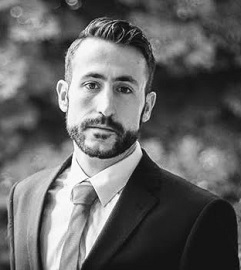
Our long-time member and supporter Eduardo García Garzón has recently completed his PhD at the Universidad Autónoma de Madrid in Spain and is now continuing his work in academia. We took the chance to talk to him about his research and JRP experience.
Eduardo joined the JRP as part of the 2013-14 cohort, working on a project examining student’s well-being at school. Since then, he has taken on several different roles within the JRP and has supported the programme in many ways.
I have to say it has been quite a ride for me at the JRP! After completing my internship and get to collaborate with Kai and the Policy Research Group at Cambridge, I felt I could contribute to expand and improve the JRP. As such, I have held several different roles for the next few years at the JRP: I was the head of the jSchool Team in Spain (2015) and Slovenia (2016), served as the Chair of the 2017 Junior Researcher Programme (and participated in another two), and organized the first-ever jMeeting in Madrid. Additionally, I have been part of the jCouncil for the last two years, assisting the JRP Team whenever it was necessary.
And he has not regretted the decision:
I could say it louder, but not clearer. Whether today I have a chance to pursue an academic career, it is thanks to Kai and the JRP. The programme has not only provided me with many occasions to join different research projects but also to acquire some crucial soft skills: organizing events, networking and collaborating with colleagues around the world. I believe that the JRP represents a unique opportunity to live an international, high-end academic experience that cannot be easily found!
Needless to be say, the best part of being part of the JRP is the amazing people (and the many friends) I have met as part of the programme. This is the “invisible” part of the programme that I came to value the most. Beyond the academic events, the experiences and people I met had thanks to the JRP have changed me at a professional and a personal level.
As a statistics enthusiast, Eduardo’s work centers mainly around the field of psychometrics and test development. Besides this, he is also interested in Positive Psychology and related policy development. In his PhD thesis, Eduardo investigated how to approach the bi-factor model in exploratory factor analysis.
This does not sound very exciting at first, but if you look around, bi-factor models are everywhere! (the g factor of psychology, the p factor of personality or psychopathology, etc.). In my thesis, my objective was to provide researchers with the statistical means for studying such models, either by developing new algorithms and software applications for their use.
After a well-deserved holiday, Eduardo will continue his academic work by teaching psychometrics and statistics at the Universidad Camilo José Cela. But he also has more plans for the future:
I would like to shift my focus on some side projects involving open science promotion and raising awareness of science reproducibility issues in psychology. There is a thriving community of researchers trying to improve research practices in Spain, so I would like to continue engaging on these activities to try to make a real change in our academic system.
Interested to know more? Examples of Eduardo’s work can be found here, here, here, and here.